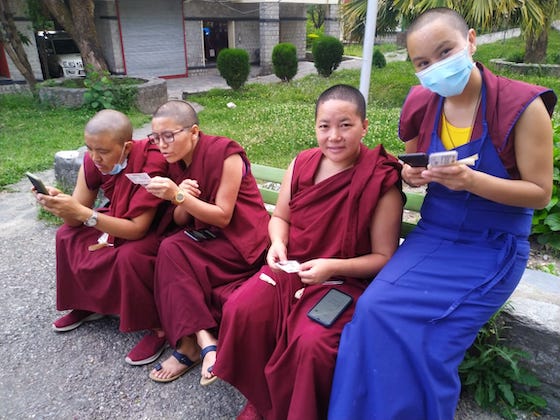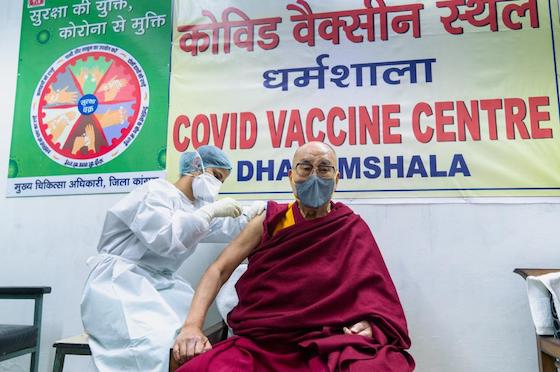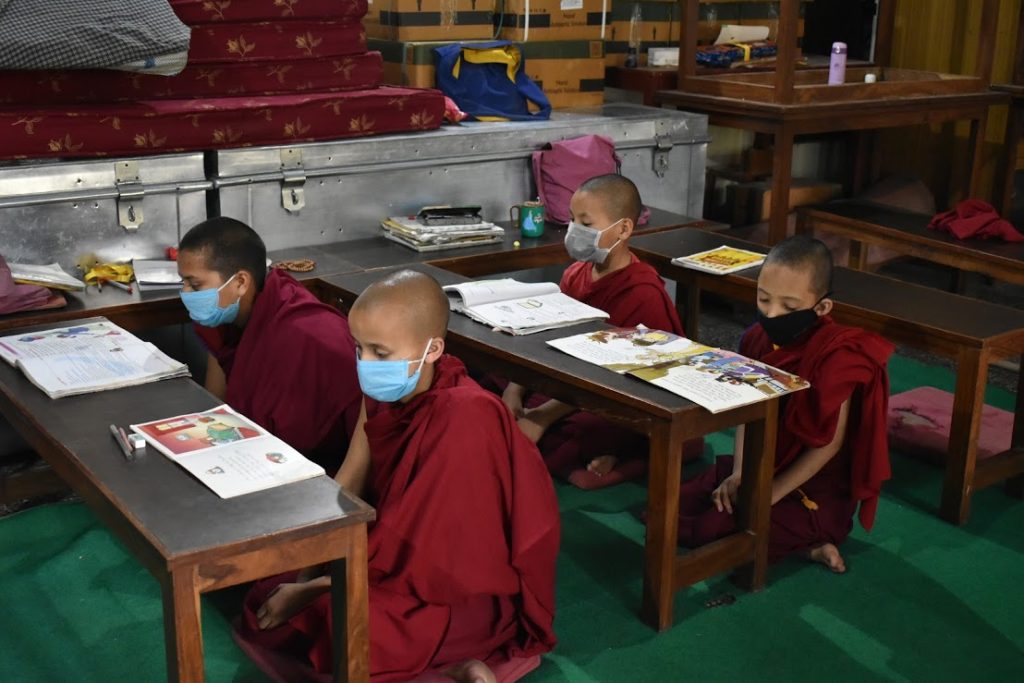As cases of COVID-19 rise in India, we know that many are concerned about the health of the Tibetan Buddhist nuns. Here’s what we know now. We will try to provide updates as often as possible.
Tibetan Nunneries Observe Precautions
The majority of the nuns are Tibetan refugees and part of a wider Tibetan diaspora while others are from remote border areas of India. Living in close communities, with classes, prayers, and shared rooms and bathrooms means that nuns are very vulnerable to the coronavirus. If the virus were to enter a nunnery, it would spread rapidly.
In the nunneries that we support, the nuns chose to be very cautious from the beginning of the pandemic and have continued that care, with almost all the nuns remaining within the monastic compound and visitors from outside not allowed.

Tibetan Buddhist nuns at Dolma Ling register to get vaccinated. They began registering at the end of April.
So far, the nuns are safe. “All the nuns and staff are well here. We are being very cautious,” said staff at Dolma Ling Nunnery and Institute, home to almost 250 nuns. “As the situation in India is not good, we have decided to keep the office and classes closed for a week.” Dolma Ling is the largest nunnery supported by the Tibetan Nuns Project.
“Luckily nuns in all the nunneries are fine and busy with their day to day schedule,” we were told on May 2nd.

Tibetan Buddhist nuns at Dolma Ling Nunnery and Institute registering last week for vaccinations.
At the end of April, nuns began registering to get vaccinated. The nuns had to register in groups of four. Four is the most who can register under one phone number, according to guidelines.
The Tibetan nunneries in India have been taking strong precautions against the coronavirus since the pandemic first broke out. Some nunneries closed to visitors in the first week of February 2020, shutting their gates and monitoring anyone who came in or out.
The nunneries have benefited from an extra level of health care from the Department of Health of the Central Tibetan Administration. As early as January 24, 2020, the Department began issuing guidelines to the monastic communities and to the Tibetan diaspora as a whole. Just one week after the WHO declared COVID-19 as a pandemic on 11th March 2020, a special Tibetan COVID-19 Task Force began working to mitigate the potentially catastrophic impact of the disease, particularly in Tibetan refugee settlements.
His Holiness the Dalai Lama Is Fully Vaccinated
His Holiness the Dalai Lama received his second dose of the COVID-19 vaccine at his residence in Dharamsala on April 26th. The vaccine was administered by a medical team of Delek hospital led by Dr Tseten Dorjee, personal physician to His Holiness.

His Holiness received his first dose on 6 March at the local government hospital. According to the Office of His Holiness the Dalai Lama (OHHDL), the entire staff and security details of His Holiness, including those living in the residence, were also vaccinated.
His Holiness the Dalai Lama again encouraged everyone to get the vaccine. He described it as “something helpful” for the greater good of humanity and he has tried to bolster public confidence in the vaccine.

His Holiness the Dalai Lama receives the first dose of COVID-19 vaccine on March 6, 2021 at the government hospital in Dharamsala, HP, India. Photo/OHHDL

His Holiness the Dalai Lama returning to his home in Dharamsala after taking the first dose of the COVID-19 vaccine on March 6th. Detail of photo by Tenzin Jigme, CTA.
His Holiness the Dalai Lama used the opportunity of his first vaccine to make a strong public statement about the importance of getting vaccinated. He said, “In order to prevent some serious problem, this injection is very helpful and good. So those other patients should take this injection for greater benefit.”
View His Holiness the Dalai Lama’s statement about COVID-19 vaccines here.
Tibetans Caught in India’s COVID Wave
A Radio Free Asia report on May 3, 2021 provided an update on how Tibetans in India are being caught in the rising numbers of COVID-19 infections as another wave of the pandemic hits India.
With more than 300,000 new infections a day for over two weeks, India is struggling.
In Dharamsala, the home of His Holiness the Dalai Lama and the Central Tibetan Administration, Tibet’s exile government, there is a shortage of vaccines at Delek Hospital. Delek Hospital is the largest Tibetan hospital in India. A doctor told Radio Free Asia that the hospital has now put an end to a program aimed at inoculating Tibetans age 18 and over.
“For now, we don’t have any vaccines in Delek Hospital, but we have a few options we are working on,” Dr. Tenzin Tsundue told RFA’s Tibetan Service.
“One idea is for us to collaborate with larger hospitals, as the amount of vaccines we would need would be too small for us to order directly from the supplier.”
Since last week, almost 140 Tibetans living in Dharamsala have tested positive for COVID-19. The numbers of Tibetans infected are rapidly rising as the virus spreads through the community, Dr. Tenzin Tsundue said.
“I urge Tibetans to get vaccinated in government hospitals now if they get the chance,” Dr. Tsundue said, adding, “Don’t wait for the Delek Hospital to get more vaccines. This is a matter of necessity now, not of choice.”

Young Tibetan Buddhist nuns at the remote Sherab Choeling Nunnery in the Spiti Valley of northern India wear masks during class. Photo from July 2020.
Some Monasteries Hit by COVID-19
83 Tibetan Buddhist monks have tested positive at Sakya Monastery in Dehradun, capital of northern India’s state of Uttarakhand, according to Radio Free Asia and sources at the monastery said.
So far, we have no news that any nuns at nearby Sakya College for Nuns have been infected. The nunnery is situated in Manduwala, about 12 miles from Dehradun and is home to about 55 nuns.
According to Radio Free Asia, Sakya Monastery had under lockdown for a year, but staff had often gone out to purchase supplies in a nearby town.
“We are isolating our monks, and no one is in serious condition yet, but a few of them have shown low oxygen levels, and so we have had them admitted to the Dekyiling Tibetan Hospital,” one source at the monastery said.
“The 83 monks who were infected are among the 225 Tibetans in Dehradun who have tested positive for COVID-19 during this second wave of the pandemic in India,” the anonymous source told Radio Free Asia.

A Tibetan Buddhist nun sews cloth masks. When the pandemic broke out in 2020, the nuns in the tailoring section who normally make robes, prayer flags, Tibetan door curtains etc. began making cloth masks to prevent the spread of COVID-19 and to protect the nuns. Photo by the Dolma Ling Media Nuns
Earlier this year, 156 Buddhist monks at Gyuto Tantric Monastery in Himachal Pradesh tested positive for COVID-19. According to reports, most of the monks were asymptomatic. About 15 monks came from Karnataka and Delhi. The first cases were reported on 23 February.
CTA COVID-19 Emergency Relief Committee Provides Regular Updates
The CTA COVID-19 Emergency Relief Committee continues to provide regular updates on the developing situation for Tibetans in India and elsewhere. In its update on April 30th, the COVID Task Force urged strict adherence to safety precautions.
“The monasteries and institutions are especially cautioned and they are advised to avail isolation rooms for unforeseen situations. Also, given the efficacy and safety of the vaccines, Tibetans are urged to get the vaccines in order to bring the normality back.”
